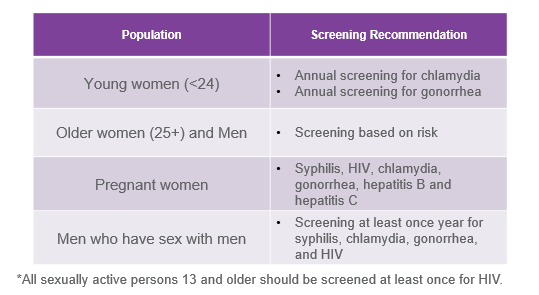Webinar: Sexually Transmitted Infections and Pregnancy
Congenital syphilis (when a baby is infected with syphilis during pregnancy) can cause miscarriage, stillbirth, or serious health problems for newborns.
Syphilis can be treated and cured with antibiotics during pregnancy, so congenital syphilis is preventable, but the California Department of Public Health reports that cases have surged in recent years. That is why it is important for home visitors and others who work with pregnant people to talk with their clients about sexually transmitted infections (STIs), encourage them to get tested, and to be sure they get treated if they have an STI.
In the recorded webinar below — hosted by LA Best Babies Network on August 14, 2023, for Welcome Baby Parent Coaches and other staff in our network of home visiting organizations and Welcome Baby hospitals — Katie Farro, MPH, an STI Prevention Specialist, discusses:
- Different types of STIs
- How having STIs can affect pregnancy
- How STIs can affect the baby
- The rising risk of congenital syphilis
- How to test for and treat STIs during pregnancy
There are several types of STIs, including:
- Bacterial: Chlamydia, gonorrhea, and syphilis
- Viral: HIV (Human Immunodeficiency Virus), HSV (Herpes Simplex Virus I & II), HBV (Hepatitis B Virus), and HPV (Human Papillomavirus)
- Other: Trichomoniasis (protozoan) and crabs (pubic lice)
CDC screening guidelines:

Data on STIs show disparities by race and age groups. This is due to many complex factors, including racism and access to quality and consistent health care.
To help underserved populations prevent and treat STIs, home visitors should discuss STIs with clients as early as possible, and help them access prenatal care and STI testing. It is important to be mindful of the many barriers to accessing sexual and reproductive health, including financial factors, fear of judgment, and previous negative experiences in medical care.
Tips for discussing reproductive health:
- Practice beforehand
- Be aware of your body language
- Empathize and validate
- Use open-ended questions that cannot be answered “yes” or “no”
- Ask, don’t guess, about a client’s sexual orientation, gender, and behaviors
- Use inclusive terms like “partner” instead of boyfriend/girlfriend
About the presenter:
Katie Farro serves as an STI Prevention Specialist for Essential Access Health’s STI Prevention Programs. In this role, she provides training and technical assistance to health centers on best practices in quality improvement, STI control and treatment, and patient management approaches. Katie also develops partnerships with community-based organizations serving populations highly impacted by syphilis and other sexually transmitted infections. She holds a Master of Public Health in Community Health Sciences from UCLA Fielding School of Public Health.
Watch the webinar recording here, and don’t miss the links to related resources below:
Related resources:
- Webinar slides
- STI and pregnancy resources (Essential Access Health)
- What are STDs/STIs? (CDC)
- STI data & reports (California Department of Public Health)
- STDs in Los Angeles County 2019 (Los Angeles County Department of Public Health)
- STIs treatment guidelines 2021 (CDC)
- Congenital Syphilis FAQ (Los Angeles County Department of Public Health)
- Racial disparities in STI in the U.S. (ScienceDirect)
- Expanded Syphilis screening (California Department of Public Health)
- Expanded Syphilis screening recommendations for the prevention of Congenital Syphilis (California Department of Public Health)
- The Diagnosis, Management and Prevention of Syphilis (New York City Department of Health)
- Pregnancy and HIV, Viral Hepatitis, STD & TB Prevention (CDC)
- Eliminating Congenital Syphilis in Los Angeles County: a call to action (Los Angeles County Department of Public Health)
- Congenital Syphilis in Los Angeles County: Women and Health Equity Conference (Los Angeles County Department of Public Health)
- “America is Failing its Black Mothers” (Harvard Public Health)
- “A qualitative assessment of structural barriers to prenatal care and congenital syphilis prevention in Kern County, California” (PLOS)
- Conducting a Sexual Health Assessment (Reproductive Health National Training Center)
- Providing quality family planning services (U.S. Department of Health and Human Services & CDC)
- Syphilis in women and Congenital Syphilis (Los Angeles County Department of Public Health)
- Pregnant women and substance use: fear, stigma, and barriers to care (National Library of Medicine)
- Take charge of your sexual health: what you need to know about preventive services (National Coalition for Sexual Health)
- 2023 Medi-Cal member handbook: reporting problems (L.A. Care Health Plan)
- Syphilis in Women Action Toolkit (Los Angeles County Department of Public Health)

